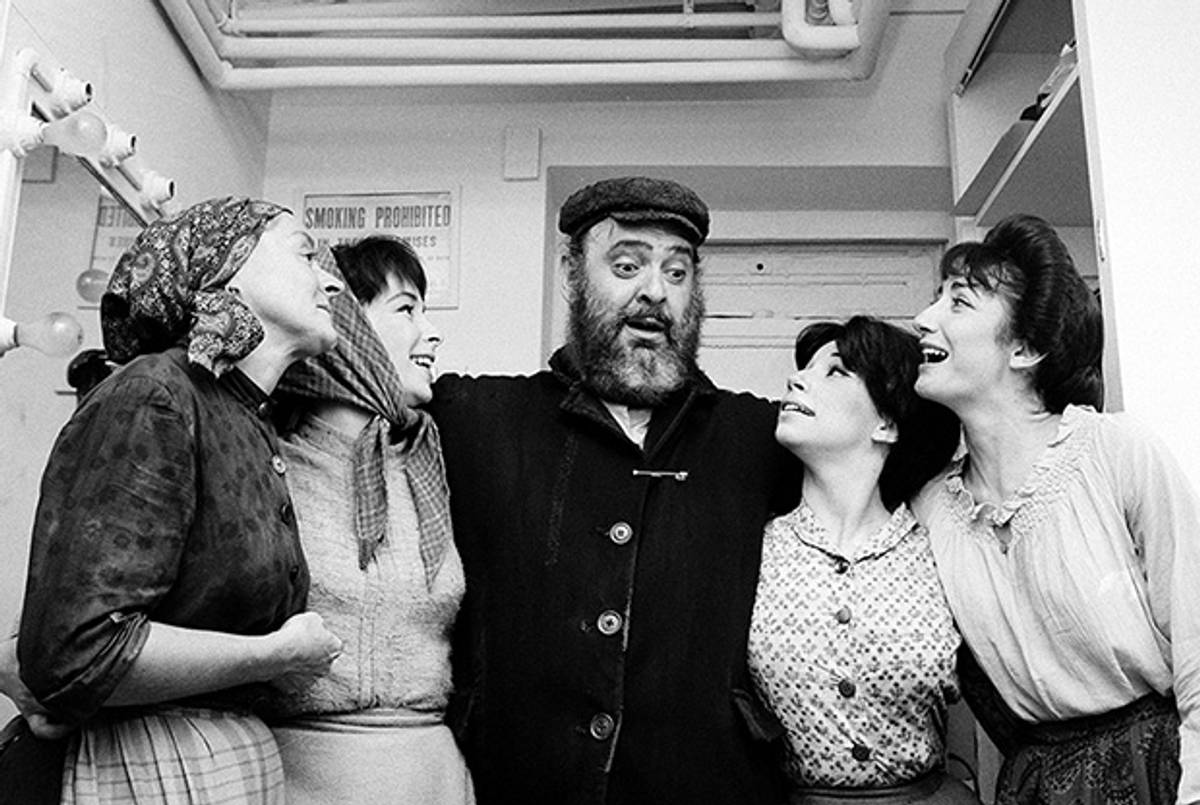The Show That Made the World Fall in Love With the Jews and Grow Nostalgic for Tevye
Alisa Solomon’s kaleidoscopic look at ‘Fiddler on the Roof’ explores the political and cultural backdrop of the 49-year-old smash

It’s fairly common nowadays to hear renditions of “Sunrise, Sunset,” for instance, or “The Sabbath Prayer,” memorable melodies from the Fiddler on the Roof, at bar mitzvahs or weddings. Songs from that musical—whose story is inspired by the work of Sholem Aleichem—have become an indelible part of our popular cultural lexicon not just in the United States, but worldwide. Directed by Jerome Robbins and starring Zero Mostel, Fiddler debuted on Broadway in 1964 and quickly became a smash, resonating with Jewish audiences comfortable enough in their assimilated lives in America to be able to look fondly back at the shtetl their parents left behind. How the play got made and what its significance has been for peoples of all ethnicities and backgrounds is the subject of a new book by Columbia University professor Alisa Solomon.
Solomon joins Vox Tablet host Sara Ivry to discuss Wonder of Wonders: A Cultural History of Fiddler on the Roof. She talks about the postwar exuberance that Jews were reveling in when the curtain went up in the ’60s, the contrasting backgrounds of Robbins and Mostel (the former was deeply ambivalent about his Jewishness and named names at the HUAC hearings in the 1950s; the latter grew up Orthodox, left that world to become an artist and performer, and was a fellow traveler with the type of person Robbins exposed) and their creative tensions; and she sings a few bars from her favorite song—one that didn’t make it into the final production. [Running time: 30:21.]
Your browser does not support the audio element.
- Vox TabletSo Long, FarewellAfter 11 years and 500 episodes, Vox Tablet signs off for good
- Vox TabletTanya’s StoryHow a young woman learned the painful lesson that there are times when trying to do what’s ‘right’ can go very, very wrong
- Vox TabletA New Kind of Prayer BookThe Conservative movement’s latest siddur goes way beyond traditional liturgy
- Vox TabletHey, Mister DJ: Put a (Diaspora-Blending, Genre-Bending) Record OnBooty-shaking new music from A-Wa, Sandaraa, and Schizophonia
- Vox TabletWhat’s Free Will Got To Do With It?Especially in election season, we love talking about the moral fiber (or lack thereof) of our candidates. But when it comes to ethics, no man—or woman—is an island.
- Vox TabletBuilders of a New JerusalemIn a new book, Adina Hoffman brings to life three architects who transformed the city in the days of the British Mandate
- Vox TabletBathe in the WatersA radio documentary asks: Is there a way for women to dunk ritually that doesn’t conflict with their feminism?
- Vox TabletBeyond DrakeA handful of personalities come to mind when we think of African-American Jews. Let’s change that.
- Vox TabletThe Saddlemaker, the Schindler, and the Miller of WlodowaGolems, messiahs, tradesmen, Nazis, and townspeople converge in the story collection ‘In the Land of Armadillos’
- Vox TabletA Year of FirstsAn audio portrait of Luzer Twersky, just after he quit his life as a Hasid, and long before he played one in films
- Vox TabletFor the Love of Suzie Louise: A Christmas StoryIn middle-century Skokie, a young Jewish boy searches for a stolen Jesus to comfort his bereft Christian girlfriend
- Vox TabletThe Most Haunted Leading ManIn ‘Son of Saul,’ actor Géza Röhrig defies our every expectation of a Holocaust movie hero
- Vox TabletGirlhood, InterruptedCynthia Kaplan Shamash fled Iraq 40-odd years ago, when she was just a kid. Her flight foreshadowed that of young refugees fleeing Syria now. Where did she land? Where will they?
- Vox TabletLet ‘Freedom’ Ring: A Flutist Gives Life to Musical Celebrations of LiberationsMimi Stillman’s new album features works inspired by upheaval in Europe and the Middle East
- Vox TabletPuzzle MasterFor years, scholars dismissed the Arabic on text fragments from Cairo’s genizah as unimportant scribbling. Then along came Marina Rustow, bona fide ‘genius.’
- Vox TabletMy Grandfather, the Secret PolicemanRita Gabis knew only that her mother’s Catholic family came from Lithuania after the Holocaust. Then she started asking hard questions.
- Vox TabletBeyond the PulpitWhat does a rabbi do in late August when he no longer needs to prep for High Holidays?
- Vox TabletAndré Aciman, Sarah Wildman, and Others Build a Summer Reading ListLooking for a good book to sink into at the beach in these waning dog days? Friends share what they’ve loved lately.